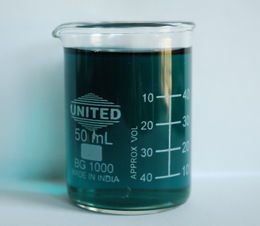Potassium manganate
 Potassium manganate solution
| |
| Names | |
|---|---|
| Other names
Dipotassium dioxido(dioxo)manganese
Potassium manganate(VI) | |
| Properties | |
| K2MnO4 | |
| Molar mass | 197.132 g/mol |
| Appearance | Dark green crystals |
| Odor | Odorless |
| Density | 2.78 g/cm3 |
| Melting point | 190 °C (374 °F; 463 K) (decomposes) |
| Boiling point | Decomposes |
| Reacts | |
| Solubility | Insoluble in hydrocarbons |
| Hazards | |
| Safety data sheet | Sigma-Aldrich |
| Flash point | Non-flammable |
| Related compounds | |
| Related compounds
|
Barium manganate Potassium permanganate |
| Except where otherwise noted, data are given for materials in their standard state (at 25 °C [77 °F], 100 kPa). | |
| Infobox references | |
Potassium manganate is a chemical compound with the formula K2MnO4. It is dark bluish green and is only stable under alkaline conditions. In neutral or acidic conditions, it decomposes to form potassium permanganate, manganese dioxide, and potassium hydroxide.[1]
Contents
Properties
Chemical
Potassium manganate, like potassium ferrate, is only stable in strongly alkaline conditions. In neutral or acidic solutions it decomposes according to the following equation:
- 3 K2MnO4 + 2 H2O → 2 KMnO4 + MnO2 + 4 KOH
This reaction is often referred to as the chemical chameleon, and the reaction is a commonly demonstrated one.
Potassium manganate will react with soluble barium salts such as barium chloride to form insoluble barium manganate, a dark blue compound that used to be used (combined with barium sulfate) as a pigment.
Physical
K2MnO4 is a dark bluish green crystalline solid that is soluble in basic solutions. The exact figure for the solubility is currently unavailable, as it does not seem to be printed anywhere. It has no odor.
Preparation
Potassium manganate can be made via fusion of potassium hydroxide and manganese dioxide and an oxidizer such as potassium nitrate. It is best to do this reaction in a stainless steel or nickel vessel, as the molten potassium hydroxide used will etch glass vessels, leading to extra impurities and ruining the container. The mixture must be heated enough for everything to melt and completely react before allowing it to cool, at which point the potassium manganate can be dissolved in a dilute potassium or sodium hydroxide solution.[2]
There will most likely be excess manganese dioxide left in the final product, which must be filtered out. Soluble impurities present may include potassium nitrate and nitrite (if potassium nitrate is used as the oxidizer). Fractional crystallization may possibly be used to separate these compounds. (This is speculation however, as this is a work in progress)
Another way to synthesize K2MnO4 is by heating a mixture of KMnO4 and KOH in solution, followed by cooling to yield green crystals:
- 4 KMnO4 + 4 KOH → 4 K2MnO4 + O2 + 2 H2O[3]
In general, potassium manganate has the same array of dirty tricks as potassium ferrate, such as reacting with filter paper, decomposing when the solution is heated, etc. The same techniques that are used to crystallize potassium ferrate (displacing with excess KOH, filtering with an inert filter, dissolving in weak KOH and recrystallizing) are useful with potassium manganate.
Projects
Handling
Safety
Manganese compounds are toxic to ingest. Doing so can lead to manganism. Manganates are oxidizers. They should be kept away from combustible materials. The basic solutions that potassium manganate must be kept in, can be caustic and damaging to the skin.
Storage
Potassium manganate can only be kept in an alkaline environment.
Disposal
Potassium manganate can be neutralized with a variety of reducing agents, as well as many oxidizing agents such as hydrogen peroxide, to potassium ions and manganese dioxide. The latter can be collected by filtering the resulting suspension, and either recycled or disposed of according to its disposal sheet.
References
Personal experience handling and investigating manganates. -zts16
- ↑ http://en.wikipedia.org/wiki/Potassium_manganate
- ↑ http://www.explorechem.com/manganese-redox.html
- ↑ Nyholm, R. S.; Woolliams, P. R. (1968). "Manganates(VI)". Inorg. Synth. Inorganic Syntheses 11: 56–61